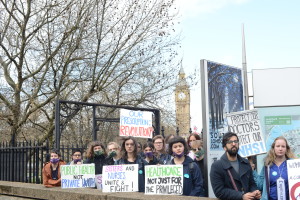Why Sisters Uncut are Joining Student Nurses at the March for Health, Homes, Jobs & Education
Friday, April 15, 2016
We’ve said it before: the dangerous new contract Jeremy Hunt is imposing on junior doctors means survivors of domestic violence will find it harder to access life saving mental and physical healthcare. Fewer doctors with less training and less time means more signs of abuse will be missed and survivors will have even fewer opportunities to receive help than they do currently. This could be the difference between life and death for many women.
In addition to this very real concern about the impact of the contract on women using the NHS, the government’s own equality impact analysis has shown that the contract will also disadvantage the women who are employed by the NHS as junior doctors. Women in fact make up 77% of the NHS workforce, although not all of those women are doctors. Women will be even more disproportionately affected by Hunt’s scrapping of bursaries for student nurses — he is now expecting student nurses to work over 2,000 hours for free.
At Sisters Uncut, we are obviously appalled by this, but sadly unsurprised. We know exactly how little value anyone in the Tory government places on women’s labour. The direct cuts to domestic violence services which this government has made, via cuts to housing benefit and local authority budgets, have also been cuts to many women’s livelihoods. Women who have spent years in the sector, building up their life saving knowledge and skills, increasingly find themselves laid off, those skills apparently not profitable enough for a Tory economy. Otherwise they are forced to work longer hours for lower pay and less job security, with unmanageable caseloads.
These caseloads mean many workers are forced to ensure a quick turnaround and can only provide basic crisis management to the women who turn to them, for example after a big, physical incident of violence, or following police involvement. This short term work often involves necessary practical measures such as lock changes and having panic alarms fitted, but it fails to address the root of the problem. It is also focused on physical abuse, causing other forms of abuse, such as coercive control, to be overlooked. It is certainly no substitute for the long term support needed in order to empower women and help them develop the knowledge, skills and resources to flee. The ‘crisis management’ approach can also contribute to revictimisation, as long term support is crucial to understanding abusive dynamics of power and control, and to building the confidence and means to flee abuse, as well as the ability to recognise abuse early in future.
On top of this, women in insecure financial situations, like the situations which workers in the domestic violence sector are increasingly being forced into, are the women most vulnerable to abuse. This is why domestic violence disproportionately affects disabled women, women of colour, and trans women, who all face significant barriers to employment, and particularly to well paid, secure employment. This is why violence against women has increased on the Tories’ watch. This is why Sisters Uncut will be marching with student nurses this Saturday, for a society in which everyone has a secure livelihood, and no one is financially dependent on an abusive partner.

